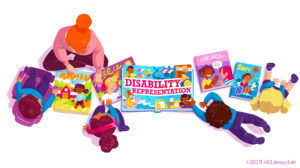Disability Picturebooks
2021 – 2024
Promoting children’s understanding of disability through picturebooks: Incorporating the perspectives of primary school teachers

Past research studies have recommended the use of realistic picturebooks and accurate disability representation (Barker and Murray, 2018; Dyches, et al., 2006). However, none of them has used the Critical Disability Theory (CDT, Goodley, 2014, 2017; Mallett & Runswick-Cole, 2014) as a lens for exploring picturebooks with disability representations, as well as studying teachers’ perceptions of these books. Different from the medical or social model of disability, CDT highlights equality and the human rights of people. The first part of the study uses a unique critical framework for comparing and contrasting the multimodal disability discourse in UK and US picturebooks. The second part of the study investigates the perceptions of UK and US teachers in two focus groups respectively, exploring their knowledge, attitudes and use of a given set of picturebooks with disability representation. The study provides insights into the different layers of picturebooks with disability representation and how these books could be used effectively to facilitate meaningful discussion and positive learning in primary school years.
You can also learn more about this project through our BERA Special Issue blogpost: https://www.bera.ac.uk/blog/picturebooks-and-childrens-understanding-of-disability-incorporating-the-perspectives-of-primary-school-teachers
If you’d like to learn more about this project or share your ideas, please contact Maggie Chan: m.k.chan@sms.ed.ac.uk
Project Team:
PhD Researcher: Maggie Chan, University of Edinburgh
Supervisors: Dr Sarah McGeown and Rachel O’Neill, University of Edinburgh
Honorary Supervisor: Prof. Richard Andrews, University of Edinburgh


Comments are closed
Comments to this thread have been closed by the post author or by an administrator.